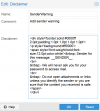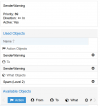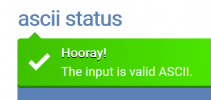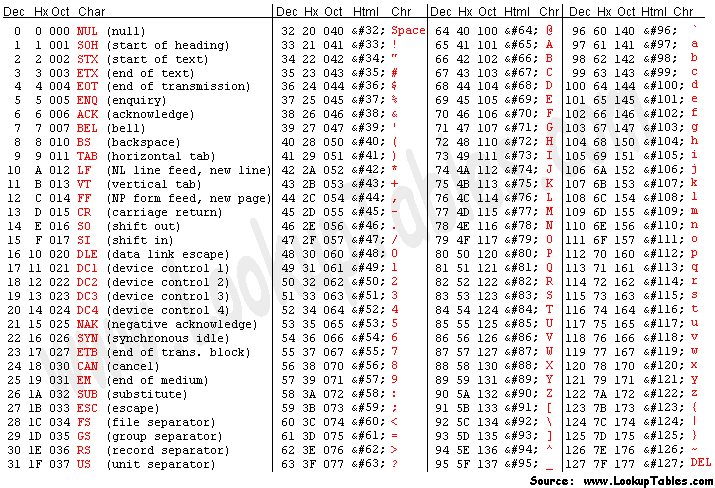Hello,
We added a new rule to our server so if the spam score is equal or higher then 2 it will add disclaimer as noted below. It is working on most messages but I just noticed that on message it failed to work properly. Can you give some advice how to find the reason why it failed to add the disclaimer and how can we make it more reliable?
Anonymized log:
Here is how the elements are configured:


If I am looking at the message in question here are some details I can share about the message:
Content-Type: text/plain; charset="iso-8859-1"
MIME-Version: 1.0
Content-Transfer-Encoding: quoted-printable
Content-Description: Mail message body
Is it possible the content type is not compatible with our disclaimer message?
Thank you for your help!
We added a new rule to our server so if the spam score is equal or higher then 2 it will add disclaimer as noted below. It is working on most messages but I just noticed that on message it failed to work properly. Can you give some advice how to find the reason why it failed to add the disclaimer and how can we make it more reliable?
Anonymized log:
Code:
Mar 25 21:47:40 ServerName postfix/postscreen[12249]: CONNECT from [SenderIP]:47846 to [ReciverIP]:25
Mar 25 21:47:46 ServerName postfix/postscreen[12249]: PASS NEW [SenderIP]:47846
Mar 25 21:47:46 ServerName postfix/smtpd[16919]: connect from mail.sender.hostname[SenderIP]
Mar 25 21:47:46 ServerName postfix/smtpd[16919]: Anonymous TLS connection established from mail.sender.hostname[SenderIP]: TLSv1.2 with cipher AECDH-AES256-SHA (256/256 bits)
Mar 25 21:47:47 ServerName pmgpolicy[16209]: SPF says pass
Mar 25 21:47:47 ServerName postfix/smtpd[16919]: NOQUEUE: client=mail.sender.hostname[SenderIP]
Mar 25 21:47:47 ServerName pmg-smtp-filter[17079]: 2021/03/25-21:47:47 CONNECT TCP Peer: "[127.0.0.1]:35368" Local: "[127.0.0.1]:10024"
Mar 25 21:47:47 ServerName pmg-smtp-filter[17079]: 1E0171605CF6F34A1A8: new mail message-id=<MessageID@mail.sender.hostname>
Mar 25 21:47:48 ServerName pmg-smtp-filter[17079]: 1E0171605CF6F34A1A8: SA score=2/5 time=0.785 bayes=0.00 autolearn=no autolearn_force=no hits=BAYES_00(-1.9),FREEMAIL_FORGED_REPLYTO(4),FREEMAIL_REPLYTO(1),KAM_DMARC_STATUS(0.01),SPF_HELO_NONE(0.001),SPF_PASS(-0.5)
Mar 25 21:47:48 ServerName pmg-smtp-filter[17079]: 1E0171605CF6F34A1A8: adding disclaimer failed (rule: SenderWarning)
Mar 25 21:47:48 ServerName postfix/smtpd[17020]: connect from localhost.localdomain[127.0.0.1]
Mar 25 21:47:48 ServerName postfix/smtpd[17020]: 236351E0763: client=localhost.localdomain[127.0.0.1], orig_client=mail.sender.hostname[SenderIP]
Mar 25 21:47:48 ServerName postfix/cleanup[17021]: 236351E0763: message-id=<MessageID@mail.sender.hostname>
Mar 25 21:47:48 ServerName postfix/qmgr[12208]: 236351E0763: from=<fromaddress>, size=3871, nrcpt=1 (queue active)
Mar 25 21:47:48 ServerName postfix/smtpd[17020]: disconnect from localhost.localdomain[127.0.0.1] ehlo=1 xforward=1 mail=1 rcpt=1 data=1 commands=5
Mar 25 21:47:48 ServerName pmg-smtp-filter[17079]: 1E0171605CF6F34A1A8: accept mail to <sendtoaddress> (236351E0763) (rule: default-accept)
Mar 25 21:47:48 ServerName pmg-smtp-filter[17079]: 1E0171605CF6F34A1A8: processing time: 0.849 seconds (0.785, 0.034, 0)
Mar 25 21:47:48 ServerName postfix/smtpd[16919]: proxy-accept: END-OF-MESSAGE: 250 2.5.0 OK (1E0171605CF6F34A1A8); from=<fromaddress> to=<sendtoaddress> proto=ESMTP helo=<mail.sender.hostname>
Mar 25 21:47:48 ServerName postfix/smtpd[16919]: disconnect from mail.sender.hostname[SenderIP] ehlo=2 starttls=1 mail=1 rcpt=1 data=1 quit=1 commands=7
Mar 25 21:47:48 ServerName postfix/smtp[17023]: 236351E0763: to=<sendtoaddress>, relay=RelayIP[RelayIP]:25, delay=0.12, delays=0.01/0/0.01/0.1, dsn=2.6.0, status=sent (250 2.6.0 Ok, message saved <Message-ID: <MessageID@mail.sender.hostname>>)
Mar 25 21:47:48 ServerName postfix/qmgr[12208]: 236351E0763: removedHere is how the elements are configured:


If I am looking at the message in question here are some details I can share about the message:
Content-Type: text/plain; charset="iso-8859-1"
MIME-Version: 1.0
Content-Transfer-Encoding: quoted-printable
Content-Description: Mail message body
Is it possible the content type is not compatible with our disclaimer message?
Thank you for your help!





